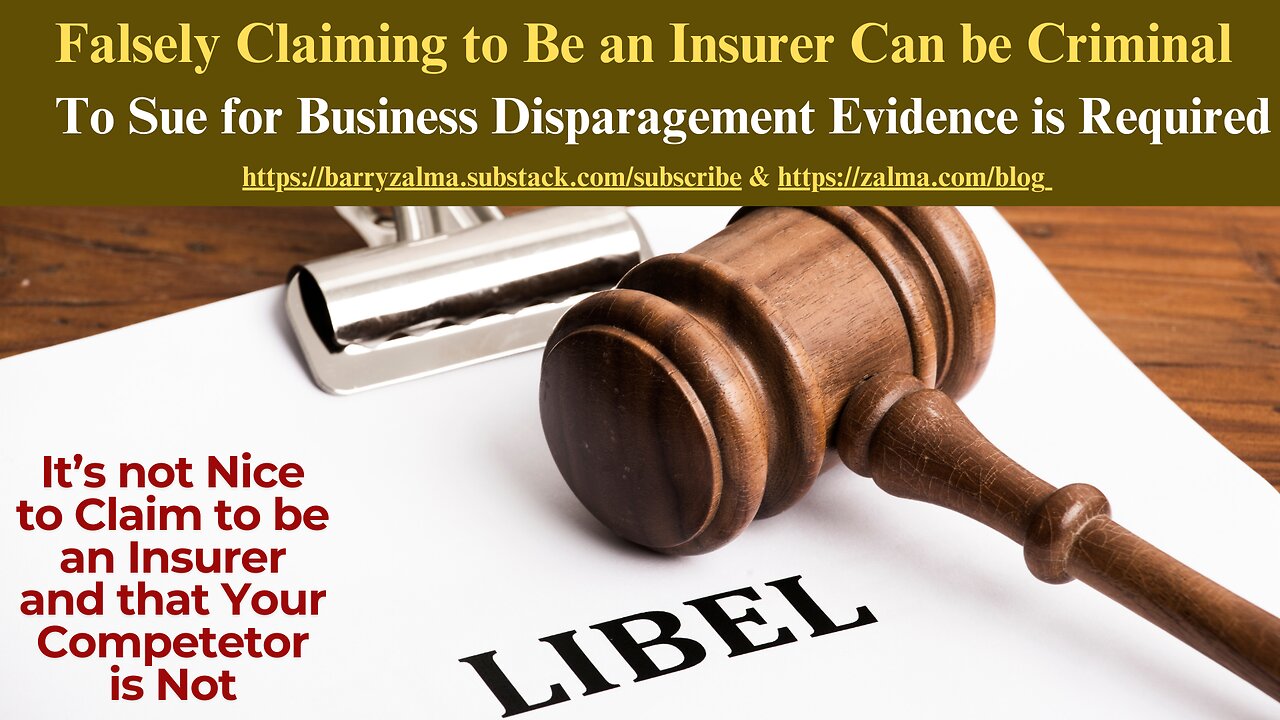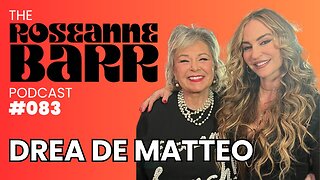Premium Only Content

Falsely Claiming to Be an Insurer Can be Criminal
To Sue for Business Disparagement Evidence is Required
Post 4951
Plaintiff Route App, Inc.'s (“Route”) moved the USDC to Dismiss two counterclaims asserted by OrderProtection.com, Inc. (“OrderProtection”). In Route App, Inc. v. Orderprotection.Com, Inc.; Julian Wilson, et al, No. 2:23cv606 DAK, United States District Court, D. Utah (December 9, 2024) found no evidence supporting a claim of business disparagement or business defamation.
BACKGROUND
This case involves a dispute between Route, a post-purchase shipping insurance provider, and a competitor, OrderProtection. In its Complaint, Route alleges that OrderProtection and several of Route's former employees misappropriated trade secrets to create a competing business. In response to Route's Complaint, OrderProtection filed an Answer and Counterclaims, asserting four causes of action: (1) Unfair Competition in Violation of the Lanham Act; (2) Defamation Per Se/Defamation/Business Disparagement; (3) Tortious Interference with Existing and Prospective Economic Relations; and (4) Negligent Misrepresentation.
The facts pertaining to OrderProtection's claim for “Defamation/Defamation Per Se/Business Disparagement” are essentially that Route employees have allegedly told OrderProtection customers and potential customers that they should work with Route instead of OrderProtection because Route is a “legal insurance provider” and OrderProtection is not.
OrderProtection argued that Route is not a licensed insurance company and that, at best, Route affiliates with an insurance producer to procure its own insurance coverage (which does not benefit customers or merchants). More importantly both Route and OrderProtection in essence both self-fund the warranty protection they provide, and thus a customer is no better off with Route's protection package than with OrderProtection's competitive offering.
DISCUSSION
Specifically, while OrderProtection's Opposition Memorandum does not explicitly state that it conceded its defamation and defamation per se claims, OrderProtection never addresses Route's argument that it could not properly maintain these causes of action in the context of this case.
Even if OrderProtection had not conceded these claims, it failed to establish that these claims are viable in the context of this case. Further, OrderProtection made no argument that Utah law recognizes a “hybrid” cause of action for “Defamation Per Se/Defamation/Business Disparagement,” wherein a business disparagement claim may be analyzed using defamation or defamation per se case law rather than case law pertaining to a business disparagement claim.
Business Disparagement
The parties agree that to state a claim for business disparagement (sometimes called injurious falsehood), OrderProtection must allege (1) falsity of the statement made; (2) malice by the party making the statement; and (3) special damages. According to Route, while OrderProtection has made allegations of lost customers, it has not named specific individuals, nor has it alleged with particularity any financial losses, which is required under Rule 9(b) of the Federal Rules of Civil Procedure.
The court declined to recognize a “business disparagement per se” cause of action in which special damages need not be alleged, and it declined to recognize a business disparagement claim that relies on a statement that is “false by implication,” which is a concept that has been recognized in defamation cases.
Route's Motion to Dismiss was granted and OrderProtection's claims for defamation and defamation per se were dismissed with prejudice. Its claim for business disparagement was dismissed without prejudice, and OrderProtection may file a Motion for Leave to Amend by January 10, 2025, if it is able to allege a proper business disparagement claim, as discussed above.
ZALMA OPINION
Two businesses claiming to be issuers of insurance who were not licensed insurers claimed to be victims of disparagement by the other. Customers, because of the various claims shifted from one party to the other who, contrary to their claims, were self funding what they alleged was insurance of shipments of goods. The court in a Solomon-like decision ignored the fact that both claimed to be insurers when they were not and used the false claims to take over clients. Both lost and the court gave OrderProtection the attempt to state a business disparagement claim implying that the court did not believe OrderProtection would be able to plead a viable cause of action.
The State of Utah Department of Insurance should consider this case.
(c) 2024 Barry Zalma & ClaimSchool, Inc.
Please tell your friends and colleagues about this blog and the videos and let them subscribe to the blog and the videos.
Subscribe to my substack at https://barryzalma.substack.com/subscribe
Go to X @bzalma; Go to Newsbreak.com https://www.newsbreak.com/@c/1653419?s=01; Go to Barry Zalma videos at Rumble.com at https://rumble.com/account/content?type=all; Go to Barry Zalma on YouTube- https://www.youtube.com/channel/UCysiZklEtxZsSF9DfC0Expg
Go to the Insurance Claims Library – https://lnkd.in/gwEYk
-
 11:57
11:57
inspirePlay
18 hours ago $7.33 earnedLongest Drive Wins! Elite Long Drivers Battle in Par 4 Elimination
54.3K5 -
 8:44
8:44
RTT: Guns & Gear
20 hours ago $4.10 earnedStreamlight TLR RM2 Laser - G | The Best PCC Light
36.2K1 -
 36:38
36:38
Athlete & Artist Show
1 month ago $2.75 earnedNCAA Hockey Was A Joke, TNT Hockey Panel Is The Best In Sports
31.5K2 -
 1:00:08
1:00:08
Trumpet Daily
1 day ago $5.33 earnedBanning Mystery of the Ages - Trumpet Daily | Jan. 17, 2025
20.4K18 -
 15:10
15:10
Chris From The 740
1 day ago $2.91 earnedEAA Girsan Disruptor X 500-Round Review: Is It Reliable?
37K3 -
 1:00:38
1:00:38
PMG
18 hours ago $5.53 earnedCarnivore & Dr. Shawn Baker - Health Starts With Food
53K4 -
 1:28:13
1:28:13
Kim Iversen
19 hours agoCancelled Chef Pete Evans Exposes The One Change That Could End Big Food and Pharma
114K96 -
 4:20:21
4:20:21
Nerdrotic
20 hours ago $86.41 earnedDaradevil Born Again, Comics Industry CRASH, Neu-Hollywood REBUILD | Friday Night Tights #337
264K66 -
 1:32:34
1:32:34
Glenn Greenwald
16 hours agoThe Future of Gaza With Abubaker Abed; Journalist Sam Husseini On His Physical Expulsion From Blinken’s Briefing & Biden’s Gaza Legacy | System Update #391
142K107 -
 1:34:48
1:34:48
Roseanne Barr
19 hours ago $31.04 earnedWe are so F*cking Punk Rock! with Drea de Matteo | The Roseanne Barr Podcast #83
110K91